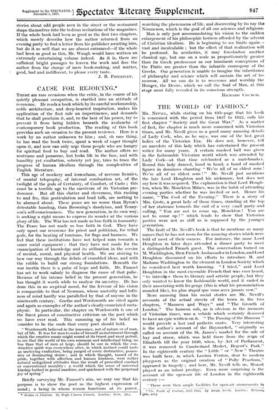CAUSE FOR REJOICING.*
THERE are rare occasions when the critic, in the course of his quietly pleasant occupation, is startled into an attitude of reverence. He reads a book which by its careful workmanship,
noble architecture, and 'deep-hearted inspiration, makes his application of the foot rule an impertinence, and demands that he shall proclaim it, and, to the best of his power, try to prevent it from being hidden beneath the avalanche of contemporary book production. The reading of this book provides such an occasion to the present reviewer. Here is a work by an author unknown to him ; and, oh rare thing, he has read the book twice, spent a week of eager thought upon it, and now can only urge those people who are hungry for spiritual food to buy and read. The author offers no nostrums and panaceas, but looks life in the face, and with humility yet exultation, sobriety yet joy, tries to trace the progress of human idealism through the complexities of English literature.
This age of mockery and iconoclasm, of nervous frenzies, of mental telegraphy, of internal combustion art, of the twilight of the gods of Certainty, of Comfort, of Caste ; this must be a terrible age to the survivors of its Victorian pre- decessor. But all this clatter and cleverness, this rushing to and fro, this gesticulation and loud talk, are nothing to be alarmed about. These poses are no worse than Byron's detestable humbug, than Browning's dandyism, and Tenny- son's self-consciousness. The new generation, in its own way, is seeking a right means to express its wonder at the various glory of life. The War has not made us lose faith in humanity. The Peace has not made us lose faith in God. They have only upset our reverence for priest and politician, for tribal gods, for the beating of tomtoms, for flags and banners. We feel that these institutions have not helped man towards a saner social equipment ; that they have not made for the emancipation of knowledge and its utilization in the service of mental, moral, and physical health. We are striving to hew our way through the debris of crumbled ideas, and with the rubble to build our strong foundations. Beneath the war inertia there is a pulse of hope and faith. Mr. Fausset has set to work calmly to diagnose the cause of that pulse. Because of his intense belief in the present generation, he has thought it worth while to analyze its ancestry. He has done this in no sceptical mood, for the fervour of his vision
is comparable to that of Newman, whose austerity and lofti- ness of mind hardly was paralleled by that of anyone in the nineteenth century. Goethe and Wordsworth are cited again and again as examples of-the author's clearlyenunciated meta- physic. In particular, the chapter on Wordsworth is one of
the finest pieces of constructive criticism on the poet which we have ever read. This summing up of his belief we consider to be the credo that every poet should hold.
" Wordsworth believed in the innocence, not of nature or of man, but of life. It was for man to make of himself an instrument through which the creative music might sound at its truest and most potent, to see that the world of his own sensuous and intellectual being, no less than that of men at large, should be one in which the con- structive spirit was everywhere alive, in which instinct could taste an uneloying exultation, being purged of every destructive, posses- sive or dominating desire ; and in which thought, tamed of its pride, together with affection and human kindness, were rather natural unlegalized attitudes than the result of prescribed conduct or conventional morality : a world which the sense of universal kinship bathed in genial sunshine, and quickened with the perpetual joy of spring."
Briefly surveying Mr. Fausset's aim, we may say that his purpose is to show the poet as the highest expression of mind ; a being in whom reason functions at its purest, • Studies in Idealism. By Hugh l'Anson Fausset. London : Dent. [66.1
searching the phenomena of life, and discovering by its ray the Noumenon, which is the goal of all our sciences and religions-
Man is only just accommodating his vision to the sudden enlargement of his philosophic horizon afforded by the advent of Christian idealism. He is beginning to see limits again— vast and incalculable ; but the effect of that realization will be profound. In aesthetics, it may foreshadow another classical age, but one on a scale as proportionately greater than its Greek predecessor as our imminent conceptions of the Finite are greater than the infantile cosmogony of the Greeks. Our generation is unable to Imagine the inheritance of philosophy and science which will sustain the art of to- morrow. All we can do is to reverence and worship the Hunger, the Desire, which we call the Soul of Man, at this stage most fully revealed in its conscious strength.
nleaARn I I: RC LI.


























































 Previous page
Previous page